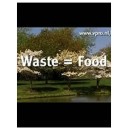Dirty Business
The booming recycling industry is paved with good intentions. Unfortunately, this same industry has also paved our international shores with mountainous heaps of discarded trash. Produced by Sky News, Dirty Business examines the journey our recyclables take after they're picked up by our local waste management professionals.
Most of us want to play our part in preserving our resources and protecting our damaged environment. That's why so many heeded the call when they were encouraged to recycle their paper and plastic products after use. It's a noble notion that leaves you with a warm feeling of having contributed to a cause greater than yourself.
The revelations contained in the film will likely strike a blow to these aspirations. Of the staggering 22 million tons of recyclable waste the U.K. collects in any given year, as little as 2% of it enjoys reprocessing. This same sobering statistic holds true for other regions of the world as well. Adding to the crisis is a widespread confusion as to which products are actually candidates for recycling.
The film exposes the path taken by our recycled products. The first stretch of this journey - from the doorstep to the recycling plant - is impressive in its efficiency and coordination. The dysfunction really begins from these points of origin. Like many other regions in the west, the U.K. trash is being shipped to other areas of the world; they don't want to deal with it in their own backyard.
The filmmakers travel to China, where a reliance on plastic scraps has made the country the unofficial rubbish capital of the world. Much of their recycled trash is imported in such massive quantities that China no longer wants it. Other countries who have tried to pick up the slack are struggling with the volume and its intrusion on their infrastructure. Shortcuts are made, processes are compromised, and countless acres of trash are abandoned in cities all over the world. The resulting environmental impact is alarming.
Dirty Business sheds valuable light on a system that most of us take for granted, and advocates for more sensible and modernized solutions.
Directed by: Stephanie Degroote




To me the solution is simple. Double the PRN! but apply it to domestic processing. This way the local solutions are incentivized and the exporters get nothing. But if that was to happen everyone would be up to their eyeballs in plastic. For a short period anyway.
This problem is a huge blow to the environment and will exceed any claims about the causes of climate change . The fossil fuel required to deal with the transporting and machinery to process plastics is horrific. This film focused on the recycling and shipping and landfill problems. However it did not mention the bigger problem of the mega amounts of it that ends up in river and the ocean.
Yes so sad and bad ...same here in Oz ... council's charge heap'$$$ ..to pick your recycle up..ends up in same way as trash ...land fill they found when checked !! why are the GREEN"S so quiet on this serious matter ??? here any way.....have we gone to far , past the tipping point, I say we have ... too many people, with no choice??
Great soundtrack. Who did the background music?
Sadly, this documentary doesn't say anything that hasn't been said before, plus, it fails to investigate the source EU dictats that stipulate local authorities' recycle volumes and timelines per capita, leaving those councils knee-jerking their recycling programs simply to meet those rules, rather than produce a properly functioning recycle system.
bruh thats why they have recycling bins for u to put your recycling in so they can take it away
This doc is no surprise to me. I read about these 'tricks' of the recycling industry back in the early 80s. Greenpeace studied it. London was shipping up to 15 barges every day to"China", when in fact it was dumped in a far far away (to London) ocean, sometimes still in the barges it came in.
Only a few years back a recycling plant demonstrated how at least 90% of the household recycling he received from different councils, was destined for landfill.
Holland and Finland are fanatical about the recycling. But I fear most still ends up in landfill. Or worse, incinerated.